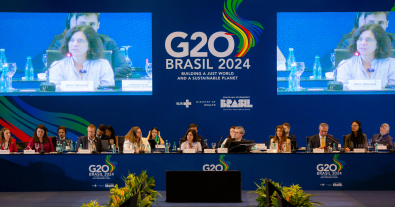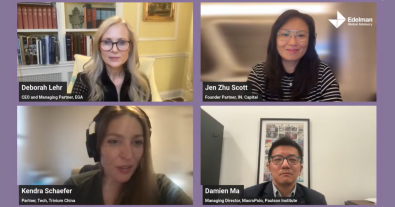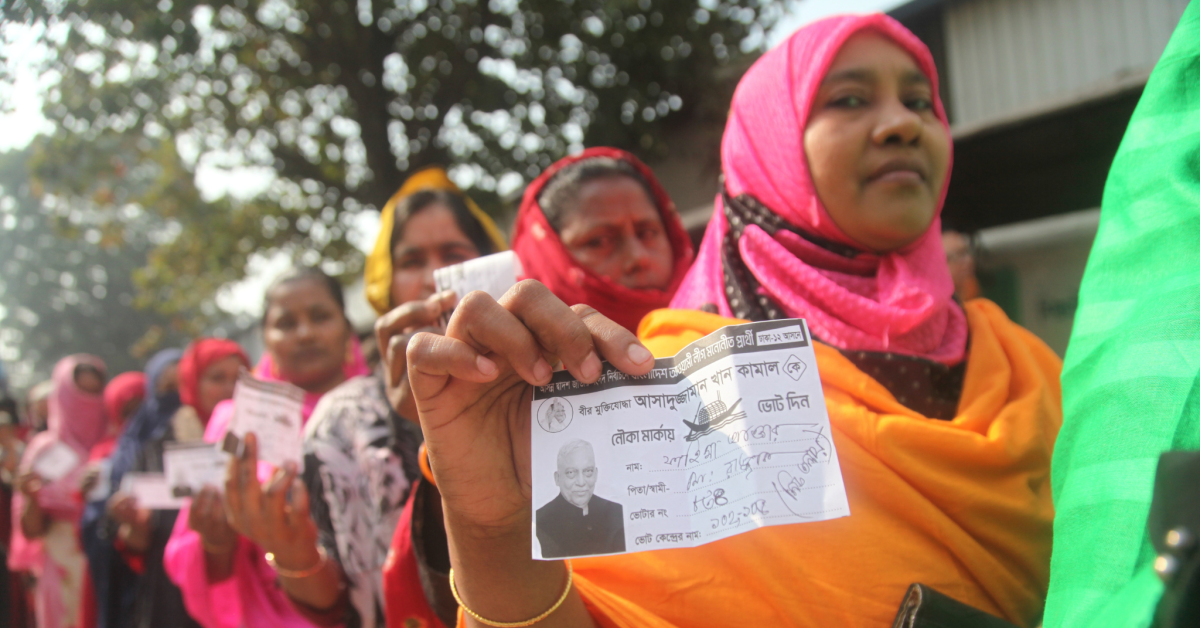China’s Two Sessions 2024
At a Glance
- On March 11, after just seven days in session, China concluded its “Two Sessions,” annual concurrent meetings of its top legislature and its top political advisory body.
- Economic stability remains a top priority with a consistent “around 5%” growth target, and science and technology, “new productive forces,” technological self-sufficiency, and AI topping the agenda.
- The decision to cancel the premier’s traditional press conference for the first time in 30 years highlights a trend towards increased opacity in the Chinese political system, making it more important than ever for companies to maintain a wide and deep array of allies in the market.
What happened at this year’s Two Sessions?
The Chinese government’s annual Two Sessions legislative meetings saw several noteworthy developments in both policy direction and process that will have implications for how businesses engage and participate in the China market.
The CCP and Xi are firmly in charge, and decision making may be becoming more opaque. The early announcement that Premier Li Qiang would not host a concluding press conference cast a shadow over this year’s proceedings. The decision broke with 30 years of tradition and what had become an important platform for the Premier to engage directly with domestic and international media. The capstone revision to the law governing the State Council—the “Organic Law”—the first since it was adopted in 1982—transferred additional power from the state to the Chinese Communist Party. It is clear the Party will continue to play a larger role over the state in all policy matters, with “Xi Jinping at the helm charting the course”—a phrase frequently repeated throughout the Two Sessions.
Facing economic headwinds, stability remains the top priority. China’s leaders have braced for slower, more difficult growth as the government remains laser focused on structural economic adjustments and achieving high-quality economic growth. The “around 5%” economic growth target announced by Premier Li is consistent with last year and ambitious, but not impossible to reach. A top focus will be unleashing “new productive forces” touted by Xi—doubling down on science and technology, and bolstering self-sufficiency in key technology areas. While stimulating consumer confidence, addressing local debt challenges, and creating jobs remain the key challenges, the government is still working on policy solutions. Li called for local governments to create 12 million urban jobs. But with 11 million expected to graduate and current unemployment rates at above 20%, there is a long way to go.
The political dynamic with centralized decision making at the very top and less transparency will require businesses to rethink their approach to engagement in China. It is more important than ever to build relationships across government, and all areas of society including the private sector, academia and community, to understand the direction of policy in China and advance long-term business interests.
Policy Themes to Watch
The Two Sessions sets the policy tone and direction for the year ahead for ministries and local leaders to implement. As the policies take shape, there are several themes coming out of the Two Sessions that are important for business to watch given the implications on the global competitive and geopolitical landscape around China.
Doubling down on technology and science-driven economic growth...and self-sufficiency. “New productive forces” is the new buzzword for economic growth drivers outside of traditional drivers like infrastructure. Xi told a delegation of officials from China’s eastern Jiangsu province—the second largest provincial economy after Guangdong—that promoting these new forces does not mean abandoning traditional industries but rather diversifying and avoiding single models of development. Officials’ priority for development are the “new three”—solar cells, lithium, and new energy vehicles (EVs)—and increasing government support, in line with China’s drive for self-sufficiency in high-tech sectors. The focus on growth industries, like EVs, hydrogen power, innovative drugs, and new materials—could continue to fuel global competition and concerns around overcapacity, an issue that is playing out for Chinese EVs and batteries in Europe and the US.
Financial and real estate risks were on the agenda—but fixes were not. The government work report mentions the word “risk” 23 times but gave few concrete solutions to the risks investors care about—namely real estate and local government debt. Instead, the report made vague promises to rectify the real estate crisis, prevent smaller financial institutions from taking on more risk, and reduce government debt. Governor of the People’s Bank of China, Pan Gongsheng, mentioned that China will welcome long-term investors into domestic financial markets but offered no further detail. While some small local banks and developers will be allowed to “fail,” others may still be propped up—it’ll be important to watch how the central and local governments work through this challenge.
“For real estate companies that are seriously insolvent and have lost the ability to operate, those that must go bankrupt should go bankrupt, or be restructured, in accordance with the law and market principles.”
— Ni Hong, Minister of Housing and Urban-Rural Development, March 9, 2024
Inching toward addressing long-term demographic and social challenges. The government for the first time called for a “proactive national strategy” to address China’s aging population, which is straining healthcare and insurance systems. While light on detail, the report also calls for reforms across health industries, including pharmaceuticals and services. The need to reform the hukou system, which has implications for people’s access to social benefits, is also under discussion.
Beijing’s foreign investor charm offensive remains in full swing. The work report reiterates 2023 rhetoric on fostering a positive foreign investment environment outlined in the “24 Measures” on ensuring equal treatment for private and foreign firms vis-à-vis state-owned enterprises, and generally addressing concerns from the foreign business community. Beijing also called on local governments to create more favorable policies to attract foreign investment in R&D. But foreign companies have yet to see sufficient action on discrete issues like cross-border data transfer that would improve business confidence—and a continued drive for self-sufficiency in technology and boatloads of government support for domestic champions are unlikely to move the needle on confidence in the near term.
China’s international relations strategy goes on the offensive to keep markets open. With the US erecting increasing trade barriers for Chinese firms and pushing allies to do so as well, keeping other markets open is a top priority for Beijing. The work report indicates Beijing aims to take a more assertive approach to international engagements—including language to reform the global governance system rather than uphold it. It also reaffirms China’s interest in participating in WTO reform, negotiating new trade and investment agreements, and implementing agreements like the Comprehensive and Progressive Agreement for Trans-Pacific Partnership (CPTPP) and the Digital Economy Partnership Agreement (DEPA).
As always, Taiwan was also on the docket. The work report lodged stern opposition to “external interference” on the Taiwan issue—language targeted at the US for ongoing military and economic support to the island. In a press conference during the Two Sessions, Foreign Minister Wang Yi reiterated that China would continue to strive for peaceful unification but warned that those who support Taiwan independence will get “burned for playing with fire.” The next inflection point in China’s approach to cross-strait relations will be the May inauguration of President-elect Lai Ching-te of the Democratic Progressive Party (DPP).
Materials presented by Chynna Hawes.
For additional information, reach out to Chynna.Hawes@EdelmanEGA.com to learn more.










